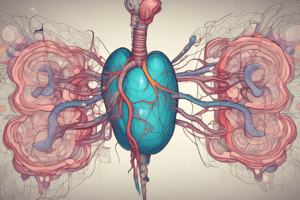Podcast
Questions and Answers
What is a possible effect of chronic smoking on pulmonary function?
What is a possible effect of chronic smoking on pulmonary function?
- Decrease (correct)
- Variable
- Increase
- No change
Which of the following is increased in patients who smoke prior to specimen collection?
Which of the following is increased in patients who smoke prior to specimen collection?
- Pulmonary function and triglyceride levels
- Glucose levels and cholesterol levels
- WBC counts and cortisol levels (correct)
- RBC counts and hemoglobin levels
What is a possible effect of ethanol consumption on blood glucose levels?
What is a possible effect of ethanol consumption on blood glucose levels?
- Decrease (correct)
- No change
- Variable
- Increase
Which of the following enzymes is increased in hemolysis?
Which of the following enzymes is increased in hemolysis?
What is a characteristic of RBC and WBC values in newborns?
What is a characteristic of RBC and WBC values in newborns?
What is a possible effect of dehydration on blood specimens?
What is a possible effect of dehydration on blood specimens?
Which of the following is a possible effect of chemotherapy drugs on blood cells?
Which of the following is a possible effect of chemotherapy drugs on blood cells?
What is the primary function of an arterial line?
What is the primary function of an arterial line?
What is an arteriovenous shunt, fistula, or graft?
What is an arteriovenous shunt, fistula, or graft?
At higher altitudes, what happens to RBC counts and related determinations such as hemoglobin and hematocrit?
At higher altitudes, what happens to RBC counts and related determinations such as hemoglobin and hematocrit?
Flashcards are hidden until you start studying
Study Notes
Diurnal Variation
- Cortisol peaks between 4-6 AM and is 50% lower at 8 PM
- Adrenocorticotropic hormone (ACTH) is lower at night and increases with stress
- Plasma renin activity is lower at night and higher when standing than supine
- Aldosterone is lower at night
- Insulin is lower at night
- Growth hormone and acid phosphatase are higher in the afternoon and evening
- Thyroxine increases with exercise
- Prolactin peaks early to late morning, decreases up to 30% during the day
- Iron levels decrease up to 30% during the day
- Calcium levels decrease by 4% when supine
Exercise
- Exercise increases lactic acid, creatine, protein, CK, AST, LDH, and potassium levels
- Prolactin levels increase in long-distance athletes
- Exercise decreases cholesterol, TAG/TGY, serum gonadotropin, and sex steroid levels in long-distance athletes
Diet
- High-protein diets elevate ammonia, urea, and uric acid levels
- Caffeine consumption increases cortisol and ACTH levels
- Carbohydrate and sugar intake increases glucose levels
- Drinking excessive amounts of water and other fluids decreases Hgb levels and causes electrolyte imbalance
- Ingestion of foods like butter, margarine, cheese, cream, and some enteral preparations increases lipid levels
- Meat, fish, iron, and horseradish consumption can lead to false positive stool occult blood test results
Stress
- Emotional stress causes transient elevations in WBCs
- Mental and physical stress induce ACTH, cortisol, and catecholamine production
Posture
- Upright position reduces plasma volume and increases protein concentration
- Albumin and calcium levels increase when changing from supine to upright position
- Changing from lying to standing can cause up to a 15% variation in total and HDL cholesterol results
Tourniquet Application
- Application increases serum enzymes, proteins, and protein-bound substances like cholesterol, calcium, and triglycerides
- Prolonged application leads to venous stasis and anaerobiosis
Tobacco Smoke
- Smoking increases cholesterol, cortisol, glucose, growth hormone, and triglyceride levels
- Chronic smoking leads to decreased pulmonary function and increased RBC counts and hemoglobin levels
Ethanol Consumption
- Increases plasma concentrations of lactate, urate, acetate, and acetaldehyde
- Increases GGT concentration and mean erythrocyte volume
- Causes hypoglycemia
Hemolysis
- Increases potassium, ammonia, iron, and enzyme levels like AST, ALT, LDH, ALP, and CK
Age
- RBC and WBC values are higher in newborns than in adults
- Kidney function decreases with age
Altitude
- RBC counts and related determinations like hemoglobin and hematocrit have higher reference ranges at higher altitudes
Dehydration
- Affects blood components like RBCs, enzymes, iron, calcium, sodium, and coagulation factors
- Difficult to obtain blood specimens from dehydrated patients
Drug Therapy
- Chemotherapy drugs decrease blood cells, especially WBCs and platelets
- Many drugs are toxic to the liver, increasing liver enzymes like ALT, AST, LDH, and decreasing clotting factors
Vascular Access
- Arterial line: a catheter placed in an artery, usually radial, for continuous blood pressure measurement and blood collection
- Arteriovenous shunt, fistula, or graft: a permanent surgical connection of an artery and vein for hemodialysis
Studying That Suits You
Use AI to generate personalized quizzes and flashcards to suit your learning preferences.




